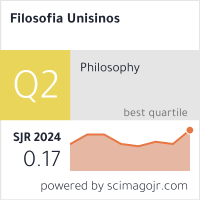On the Adequacy of Attitude-Ascriptions
DOI:
https://doi.org/10.4013/fsu.2022.232.02Resumen
Fregeans and Russellians defend different conceptions on the truth-conditions of reports of attitude ascriptions. Very often, they appeal to our intuitions and to pragmatic aspects to support their view. In this paper I propose a principle of adequacy of attitude-ascriptions. In the first section, I review the old puzzle concerning the failure of the principle of substitution salva veritate in attitude ascriptions. In the second section, I present my principle, which is based on the claim that by choosing a designator for an attitude-ascription a competent speaker is usually oriented by her supposition of the hearer’s epistemic state concerning the referent. In section 3, I apply my conception to some traditional tricky examples of attitude ascriptions in the literature. In section 4, I argue that even in non-standard situations (e.g. context of irony) a competent speaker must take into account the hearer’s epistemic state. Then, in the fifth section I suggest a consequence of my proposal for the discussion on exportation. Finally, in the concluding remarks I sketch some thoughts about the possibility of extending my pragmatic proposal to a semantic account of the truth-conditions of attitude-ascriptions.
Keywords: Attitude ascriptions, exportation, contextualism, pragmatic adequacy.
Descargas
Métricas
Descargas
Publicado
Cómo citar
Número
Sección
Licencia
Derechos de autor 2021 Filosofia Unisinos

Esta obra está bajo una licencia internacional Creative Commons Atribución 4.0.
Concedo a revista Filosofia Unisinos – Unisinos Journal of Philosophy o direito de primeira publicação da versão revisada do meu artigo, licenciado sob a Licença Creative Commons Attribution 4.0 (que permite o compartilhamento do trabalho com reconhecimento da autoria e publicação inicial nesta revista).
Afirmo ainda que meu artigo não está sendo submetido a outra publicação e não foi publicado na íntegra em outro periódico e assumo total responsabilidade por sua originalidade, podendo incidir sobre mim eventuais encargos decorrentes de reivindicação, por parte de terceiros, em relação à autoria do mesmo.











